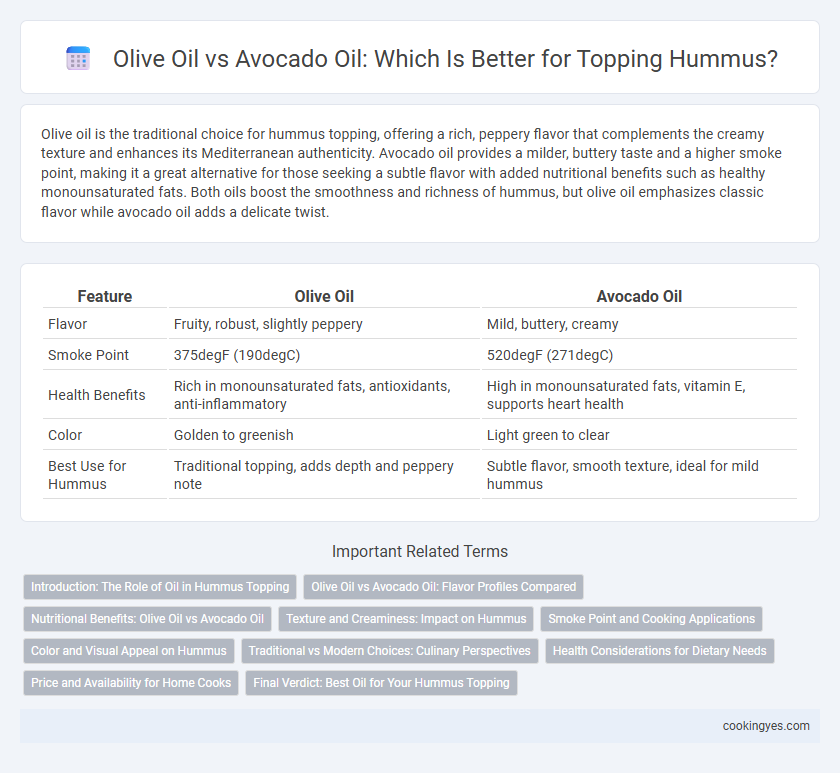Olive oil is the traditional choice for hummus topping, offering a rich, peppery flavor that complements the creamy texture and enhances its Mediterranean authenticity. Avocado oil provides a milder, buttery taste and a higher smoke point, making it a great alternative for those seeking a subtle flavor with added nutritional benefits such as healthy monounsaturated fats. Both oils boost the smoothness and richness of hummus, but olive oil emphasizes classic flavor while avocado oil adds a delicate twist.
Table of Comparison
| Feature | Olive Oil | Avocado Oil |
|---|---|---|
| Flavor | Fruity, robust, slightly peppery | Mild, buttery, creamy |
| Smoke Point | 375degF (190degC) | 520degF (271degC) |
| Health Benefits | Rich in monounsaturated fats, antioxidants, anti-inflammatory | High in monounsaturated fats, vitamin E, supports heart health |
| Color | Golden to greenish | Light green to clear |
| Best Use for Hummus | Traditional topping, adds depth and peppery note | Subtle flavor, smooth texture, ideal for mild hummus |
Introduction: The Role of Oil in Hummus Topping
Olive oil enhances hummus with a rich, fruity flavor and traditional Mediterranean authenticity, while avocado oil offers a mild, buttery taste with high smoke point and nutrient density. Both oils contribute healthy monounsaturated fats that improve texture and mouthfeel, making the hummus creamier and more indulgent. Choosing between olive oil and avocado oil depends on desired flavor profiles and nutritional benefits, balancing classic taste versus subtle richness.
Olive Oil vs Avocado Oil: Flavor Profiles Compared
Olive oil offers a robust, fruity, and slightly peppery flavor that complements the earthy, nutty taste of traditional hummus, enhancing its Mediterranean authenticity. Avocado oil provides a milder, buttery, and slightly nutty flavor that creates a smoother, more subtle topping for hummus, appealing to those who prefer less pronounced oil profiles. Choosing between olive oil and avocado oil for hummus depends on desired flavor intensity and regional pairing preferences.
Nutritional Benefits: Olive Oil vs Avocado Oil
Olive oil is rich in monounsaturated fats and polyphenols, which support heart health and offer strong anti-inflammatory properties. Avocado oil also contains high levels of monounsaturated fats and is packed with vitamin E, promoting skin health and antioxidant protection. Both oils enhance hummus with healthy fats, but avocado oil provides slightly higher vitamin E content, while olive oil delivers potent polyphenols for cardiovascular benefits.
Texture and Creaminess: Impact on Hummus
Olive oil enhances hummus with a rich, slightly peppery texture that adds smoothness without overpowering the chickpeas' natural creaminess. Avocado oil contributes a lighter, silkier mouthfeel, making the hummus appear glossier and more velvety. Both oils improve texture and creaminess, but olive oil offers a robust, traditional finish while avocado oil delivers a subtle, buttery softness ideal for delicate toppings.
Smoke Point and Cooking Applications
Olive oil, with a smoke point of around 375degF (190degC), is ideal for drizzling over hummus, enhancing flavor without overheating. Avocado oil boasts a higher smoke point of approximately 520degF (271degC), making it suitable for cooking or warming hummus without degrading its nutritional properties. Choosing between olive oil and avocado oil depends on whether the hummus is served cold or heated, balancing flavor nuances and heat stability.
Color and Visual Appeal on Hummus
Olive oil enhances hummus with a rich golden-green hue that accentuates its creamy texture, creating a traditional Mediterranean appearance. Avocado oil offers a lighter, yellow-green shade that provides a subtle contrast and a fresher, more modern visual appeal. Choosing between olive oil and avocado oil for hummus topping influences its color intensity and overall presentation, impacting the dish's appetizing look.
Traditional vs Modern Choices: Culinary Perspectives
Olive oil remains the traditional choice for hummus topping, prized for its rich, fruity flavor and antioxidant properties that complement the classic Middle Eastern dish. Avocado oil, a modern alternative, offers a milder taste and higher smoke point, appealing to health-conscious consumers seeking a buttery texture without overpowering the hummus. Culinary perspectives highlight olive oil's cultural authenticity while recognizing avocado oil's versatility and nutritional benefits in contemporary cuisine.
Health Considerations for Dietary Needs
Olive oil, rich in monounsaturated fats and antioxidants, supports heart health and inflammation reduction, making it ideal for Mediterranean and low-cholesterol diets. Avocado oil, also high in monounsaturated fats but with a higher smoke point and vitamin E content, suits those seeking anti-inflammatory benefits and skin health improvement. Both oils complement hummus while catering to dietary needs like cardiovascular health and antioxidant intake.
Price and Availability for Home Cooks
Olive oil remains the most popular topping for hummus due to its rich flavor, widespread availability, and affordable price, making it accessible for most home cooks. Avocado oil, while offering a mild flavor and health benefits, tends to be more expensive and less readily found in regular grocery stores. Home cooks on a budget or with limited local options typically prefer olive oil for its cost-effectiveness and convenience.
Final Verdict: Best Oil for Your Hummus Topping
Extra virgin olive oil remains the top choice for hummus topping due to its rich, fruity flavor and traditional Mediterranean pairing that enhances the creamy texture. Avocado oil offers a mild, buttery taste and higher smoke point, making it suitable for those seeking a subtle twist and health benefits like monounsaturated fats. For an authentic, robust taste with nutritional benefits, extra virgin olive oil delivers the best overall impact for hummus.
Olive Oil vs Avocado Oil for hummus topping Infographic

 cookingyes.com
cookingyes.com